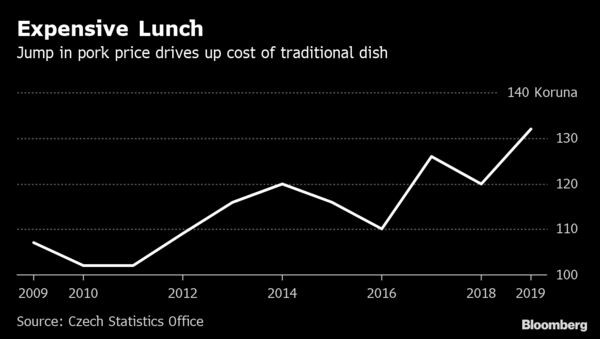The gut-busting Bohemian delight of pork, dumplings and stewed cabbage, which takes the blame for the quaffing of many a Pilsner — and the sneaking of many an afternoon nap — has never been more expensive.
Known as Vepro-knedlo-zelo for its three basic ingredients, the go-to Sunday meal for Czechs and staple of Prague pubs has skyrocketed in price due to a drought last year and a fever that’s devastating pig herds in Asia.
The cost of cabbage leapt 175% in May from a year earlier, while pork rose about 10%, according to the Czech Statistical Office. The price of potatoes, key to a popular type of dumpling, rose 88%, helping drive overall price growth to the top of the range that the central bank is comfortable with.

“The classic Czech feast of pork and dumplings with cabbage definitely costs more now,” said Lukas Kovanda, an economist from the investment company Czech Fund. “It has already been translated onto restaurant menus.”
Like traditional dishes everywhere, each region, town or even family may have its own recipe. But with the pricier ingredients, the average cost of a single serving rose by a third to about 25 koruna ($1.11) in May.
Even the price of beer — which the Czechs drink more per person than any other nation — has gone up by 7%. But if it’s any consolation, a half liter of Pilsner Urquell, the mass-market tipple from the city of Plzen, where the type of lagers got their name, can still be found in almost any pub for less than 50 koruna ($2.20).
Lukáš Kovanda, Ph.D., je český ekonom a autor ekonomické literatury. Působí jako hlavní ekonom Trinity Bank. Analyzuje a komentuje makroekonomická témata, investice i nové fenomény typu sdílené ekonomiky, kryptoměn či fintechu. Přednáší na Národohospodářské fakultě Vysoké školy ekonomické v Praze.
Je členem vědeckého grémia České bankovní asociace.